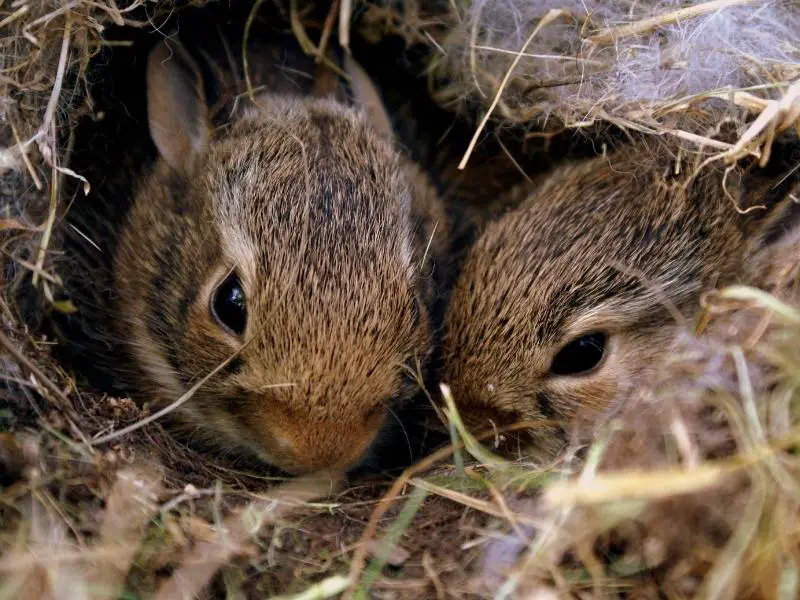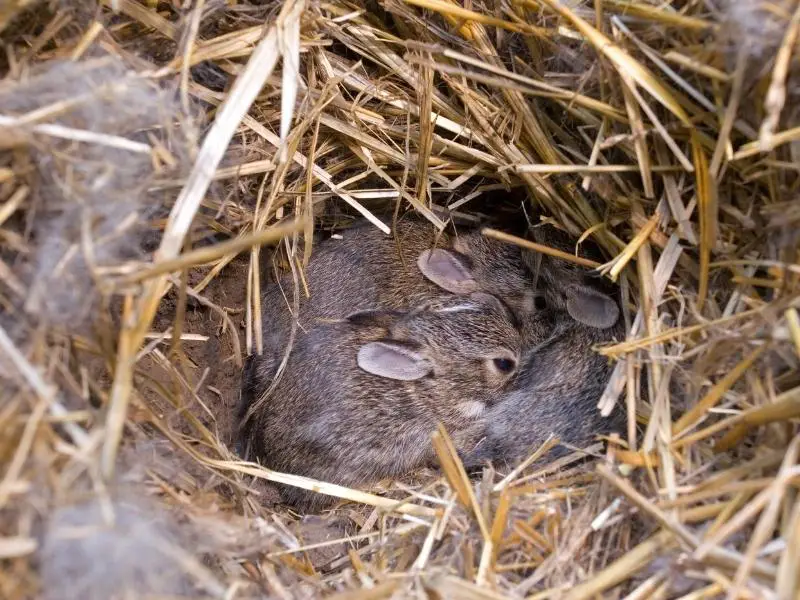So you’ve been blessed with a gorgeous, fluffy litter of baby bunnies. As a new bunny owner, you may be wondering what goes on in the nest and if you should risk taking a peek inside. You can’t wait to see the new additions to your bunny family.
But when do baby bunnies leave the nest?
Baby bunnies, also known as kits or kittens, leave their nest between three to five weeks. When they’re ready to leave the nest, their eyes will be open, their ears erect, and they can hop easily. A kit will be roughly the size of a fully grown chipmunk (5 to 10 inches) by this stage.
Are you interested in breeding rabbits but are unsure when the babies should start leaving the nest? Then this detailed guide will provide you with all the information you need to get started.
When Can Baby Bunnies Leave the Nesting Box?
Your cute kittens should be ready to leave the nesting box and explore by three to five weeks old. Just because they’re ready to leave the nest doesn’t mean they’re entirely independent (just yet).
Your kittens will still need to feed once or twice a day from their mother until they’re 8 weeks old.
On the other hand, wild rabbit kittens leave the nest between 15 to 20 days and no longer need their mother. These rabbits are ready to survive on their own in the wild.
Your baby rabbits won’t all leave the nesting box at the same time. Some bunnies are ready to venture out sooner than others. It all depends on the kit.
If you notice a lone kitten outside the nesting box and it’s been around 3 weeks since they were kindled (born), it doesn’t mean the kit has been orphaned.
This means the bunny was ready to leave the nest, and you’ll notice a couple more leaving over the next few days.
Signs That Your Bunnies Are Ready to Leave the Nest

Let’s take a closer look at some of the signs that your baby bunnies are ready to leave the nest:
Size of the Kit
When kittens are kindled, they’re only around 2 to 3 inches long and weigh about 1-2 ounces.
At this stage, they’re far too small to fend for themselves and wholly dependent on their mother.
However, rabbits grow at a rapid rate. Your kittens will be ready to leave the nest once they reach a length of around 5 to 10 inches.
Eyes Are Open
A kit’s eyes typically open around 6 to 10 days old. Once a kit’s eyes are open, they could be ready to leave the nest.
Top Tip: A kit whose eyes are closed and is outside the nesting box is most likely an orphan and has been kicked out of the nest.
You’ll need to take the kit to the vet to provide them with the correct care.
Fluffy Bunny
Kittens are born without fur, which means they’re easily affected by the weather and temperature change. Their fluffy coats start growing after about a week.
Once the kittens have all their fur, this is an obvious sign that they’re ready to leave the nest.
What Do Baby Bunnies Do When They Leave the Nest?
Once your baby bunnies have left the nest, they’ll start exploring their living environment. It’s vital to remember that your kittens won’t be totally independent just yet.
Here’s a look at what bunnies do when they leave the nest:
- At around 3 weeks old, the kittens will start producing cecotropes (nutrient-dense droppings), which they eat in the early morning for extra nutrition.
- Kittens are playful and curious animals. They’ll play with the other kittens and chew on any safe toys (wooden chew toys) you provide them with.
- They’ll hop in and out of the nest box to feed from the doe until they’re weaned at around 8 weeks old.
- Kittens will nibble on new food that’s offered to them, such as hay and pellets.
By 8 weeks old, your kittens should be independent and ready to be rehomed (if you’re breeding rabbits for a profit).
Do Baby Bunnies Come Back to Their Nest?
Domestic baby bunnies do return to their nest to feed from their mother. This happens about twice a day for around five minutes at a time.
You’ll often find baby kittens huddled together in the nest box when they’re sleepy. The nest is soft and warm (the perfect spot for a baby bunny to sleep).
If the bunnies are startled by another pet or you, they’ll instinctively run and hide in the nest box. However, kittens can’t stay in the nest indefinitely, as a nest box needs to be removed and cleaned.
A female rabbit (doe) can also fall pregnant and have another litter before the kittens are fully weaned. The nest box will become too crowded, and the doe will chase the older kittens out.
How Long Does a Mother Rabbit Stay with Her Babies?
A domestic rabbit will stay with her kittens for 6 to 8 weeks. The kittens are helpless and rely on their mother to feed and protect them. A female rabbit won’t stay with their kittens all day and will only return to the nest about once or twice a day to feed them.
The doe must eat and exercise so she can produce milk to feed her babies. Wild female rabbits spend a lot of time away from the nest and only return at night, so they don’t attract predators to the nest.
Mother rabbits must also stimulate the kittens to help them pass urine and poop. This is done by licking the kitten’s bottom.
A number of mammals need to do this for their young (such as cats). The doe will also clean the nest for the baby bunnies, as it can quickly become soiled.
The mother rabbit will no longer need to stay with her babies once they’re independent, at around 8 weeks old.
Did you know? One feeding from a doe is enough to sustain a baby rabbit for the entire day.
My Last Bunny Thoughts
While rabbits are cute, cuddly, and seem very loving, most rabbit mothers aren’t very motherly. This is because most kittens’ chances of survival are slim, so the doe doesn’t bond with their young.
As a bunny owner, you’ll need to monitor the nest and the kittens closely. Rabbits are unable to pick up their young and move them around. If you notice a baby bunny lying outside the nest with closed eyes, they’re an orphan.
When a baby rabbit leaves the nest too soon, it can die from starvation. Nature can be cruel sometimes, but with the proper care and advice from your vet, you may be able to save any kittens that have left the nest too early.
Related Articles:

